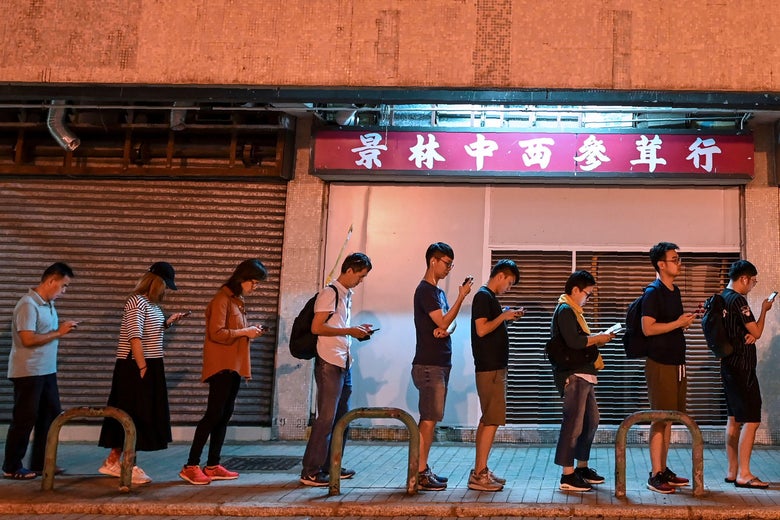
People wait in line to cast their votes during the district council elections in Tseung Kwan O district in Hong Kong on Nov. 24, 2019.
YE AUNG THU/Getty Images
Sunday’s local election results in Hong Kong delivered a decisive victory for the pro-democracy protest movement in the semiautonomous Chinese territory, trouncing Beijing-aligned establishment parties amid record turnout. After months of increasingly violent protests, the local council elections, despite notional functional power, were seen as a referendum on the movement protesting Beijing’s creeping control over the island that was under British control until 1997. Pro-democracy candidates won an overwhelming 389 of 452 elected seats, up from 124 seats in the previous election, amounting to the utter collapse of the pro-government bloc, which saw its tally fall from 300 seats to just 58.
Turnout was at a historic high, topping 70 percent of eligible voters, far surpassing previous turnout percentages, which hovered in the 40s. By comparison, in the local election following the Umbrella Movement in 2014, a period of high engagement that was similarly fraught, turnout peaked at 47 percent. This time around, the number of registered voters climbed to a new record of 4 million, with 390,000 those newly registered in the wake of the protest movement. Some 3 million of those voters turned up to vote, delivering pro-democracy candidates 17 of 18 districts and over 80 percent of contested seats.
The Hong Kong election, exceptional in China, is held as part of the negotiated terms of Hong Kong’s return to Beijing following British rule, and, like local elections most everywhere, are typically centered on neighborhood issues from bus stops to trash collection. Sunday’s vote was far different in that it was seen as a rare opportunity to issue support for the pro-democracy movement and speak directly to Beijing, which has held a hard rhetorical line in support of the Hong Kong government, but has not taken more aggressive and invasive action to quell the protests.
The local council elections also have real influence on the balance of power in determining the 1,200-member election committee that selects the city’s leader. The city’s leadership, including Hong Kong’s deeply unpopular chief executive Carrie Lam, is not directly elected, and the district councils get to nominate 117 members, roughly ten percent, of the election committee, which is typically packed with pro-Beijing representatives. Pro-democracy advocates currently make up roughly a quarter of the committee, which, bolstered by Sunday’s sweeping gains giving them near absolute control of the local councils, will give pro-democracy forces significant influence, if not quite majority control.
The election leaves Hong Kong and Beijing at a crossroads over what comes next. “Many have pointed out that the results reflect the public’s dissatisfaction with the social situation and deep-seated problems,” Carrie Lam said. “[The government will] listen to the views of the public with an open mind and seriously reflect on them.”
from Slate Magazine https://ift.tt/2OiRFb6
via IFTTT
沒有留言:
張貼留言